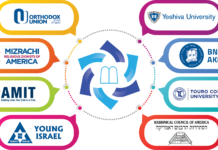No one can understand the daily fiscal and emotional challenges associated with extreme poverty -except for those who have actually experienced it. For Aryeh Lurie, this awareness has been felt, and combatted for generations, and helping to combat poverty in Israel runs in his genes.
Aryeh Lurie, the founder of Jerusalem’s Yad Ezra V’Shulamit is part of a family of trailblazers who have literally risked life and limb to save starving and poverty stricken citizens, underscored by a heroic effort to feed the besieged Jews of Jerusalem prior to the War of Independence, which ended in tragedy.
“My great-grandfather, who was not the richest of people in Basra, Iraq cared for his community by providing rooms in his house, as well as food and parnasa (jobs) to those in need. My grandfather (from the other side of the family), who also ate by him, earned money and ended up marrying his daughter,” Aryeh fondly recollected. “When the family came to Israel before the War of Independence, the Jews of Jerusalem were under constant siege. The family had owned a truck delivery business. When they were commissioned to deliver food to the starving people in Jerusalem, the only highway was the Burma Road. That road was constantly attacked by Arab marauders. Along the way, a family member got out of the truck for a moment, stepped on a mine and was mortally wounded. When my grandfather got news of this, he died of a heart attack.”
As a result, the Lurie family was left to fend for themselves in abject poverty.
“Even as a young, poor child in Jerusalem, my mother, Shulamit would make a pot of Hamin (Sephardic chulent) and make sure some of the food was given their even poorer neighbors. Lurie revealed, “I would even take a bag of food with me to school to give to poor kids in my class.”
In 1998, Lurie decided to formally create Yad Ezra V’Shulamit, an organization that was named after his parents (Ezra, z”tl and Shulamit). They started by distributing food packages to 50 families across Jerusalem.
Realizing that hundreds of families needed a lot more than just a nourishing food package, Lurie gradually increased Yad Ezra V’Shulamit’s outreach to provide a framework for young people to push themselves out of the brutal cycle of poverty.
“When I deal with families who need assistance, I like to meet people face to face and see what is going on. I remember the struggle of my childhood every day. I want youngsters to not only eat but make sure that they have proper clothing, a briefcase, notebooks and pens when they go to school-the basics. This enables youngsters to feel good about themselves and helps with their learning skills. Getting a proper education gives them a chance to leave poverty behind,” Lurie maintained.
Lurie is acutely aware of the government’s annual poverty statistics, which during the last year have shown a slight decrease nationally, yet continues to rise in metro Jerusalem. “From an economic point of view, Israel appears to be in a great place but when the economy becomes strong, cost of living expenses also rise. Those families who can’t keep up with cost of living expenses can easily fall into poverty,” Lurie explained. “When that happens, families and their children feel left behind.”
To say that Yad Ezra V’Shulamit is a “lean” organization is an understatement. Their headquarters are located in a non-descript, old building in central Jerusalem. Lurie doesn’t have a fancy office, just a simple desk and chair. “I am a modest person who is dedicated to helping others. I don’t need a fancy office, home or car. I actually ride my bicycle to work,” he admitted.
Yad Ezra V’Shulamit has various programs, ranging from the delivery of 3,000 food packages weekly and breakfasts for hungry children, centers for hundreds of elementary school kids to get a hot lunch and help with their homework, walk-in Children’s & Teen Youth-At-Risk Centers, a Job Desk and a spectacular new Community Center in Safed (Tzfat) to feed an additional 250 children. The community center is within a very poor neighborhood and will not only supply meals but also offer a whole range of services. The community center will have a simcha hall, which will help to provide jobs for locals. Lurie feels that, “The new center is a contemporary version of what my grandfather did in Iraq. It’s like coming full circle.”






